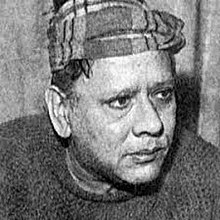Tanvir Naqvi
Tanvir Naqvi | |
|---|---|
 Syed Khursheed Ali a.k.a. Tanvir Naqvi | |
| Native name | تنویر نقوی |
| Born | Syed Khursheed Ali February 16, 1919 Lahore, British India |
| Died | November 1, 1972 (aged 53) Lahore, Pakistan |
| Pen name | Tanvir Naqvi |
| Occupation | Lyricist, Poet |
| Language | Urdu, Punjabi |
| Nationality | Pakistani |
| Genres | Gazal, Nazm |
| Notable awards | 3 Nigar Awards in 1959, 1960 and 1971 |
| Spouse | Eidan Bai (Noor Jehan's sister) |
| Musical career | |
| Origin | Iran |
| Occupation(s) | Songwriter |
| Years active | 1946 – 1972 |
| Associated acts | |
Tanvir Naqvi (born Syed Khursheed Ali; 16 February 1919 – 1 November 1972), also spelled Tanveer Naqvi, was a Pakistani lyricist and poet. He wrote lyrics for 200 uncertain films, including Lollywood and Bollywood.[1] He made his debut in Indian cinema with Swami film directed by Abdul Rashid Kardar,[2] and later remained active in Pakistani film industry for over fifteen years.[3] He earned recognition after writing "Aawaz De Kaha Hai" song for Anmol Ghadi film and "Rang Laayega Shaheedon ka Lahoo" song covering 1965 India-Pakistan war.[1][4]
He was born in Lahore, British India (in modern-day Lahore, Pakistan). He originally belonged to a family of Persian writers from Iran, and married Noor Jehan's sister, Eidan Bai.
Career[]
As a lyricist, he started his career around 1946 at early age, but after moving to Pakistan, he wrote lyrics for Urdu and Punjabi language films, including Pakistan's first feature film Teri Yaad. He also wrote for Salma (1960), Noor's first film as a playback singer.[2] In 1933, he went to Bombay when a film director Abdur Rashid Kardar invited him there. Prior to his debut in films, he was writing gazals, but later used to wrote songs for Hindi, Urdu and Punjabi films. He is also credited for writing lyrics for Pakistan's patriotic song titled "Rang Laye Ga Shaheedon Ka Lahoo", sung by Noor Jehan. He wrote this song from one of his poems. During his career, he wrote two prominent naats such as "Shah-e-Madina Yasrab Ke Wali" and "Jo Na Hota Tera Jamal Hi".[4] Before the split of Indian subcontinent, Naqvi was recognized one of the greatest classical writers in Punjabi poetry and literature between 1950s and 1970s.[5]
After partition, the Pakistan film industry didn't produce many films, and by the end of 1952, it had made only five films. Later, Khwaja Khurshid Anwar, a Pakistani filmmaker and a music director teamed up with several other people, including Tanvir Naqvi as song writer. The team succeeded in making some films between 1956 and 1959, focused on psychological issues experienced by actors due to multiple cultural conflicts.[6]
Filmography[]
| Remarks denote a short description of the work where available. |
| # | Title[2] | Year | Type/Credited as | Remarks |
|---|---|---|---|---|
| 1 | Anmol Ghadi | 1946 | Lyricist | Wrote the highly popular song Aawaz De Kahan Hai, composed by Naushad for this film[4] |
| 2 | Jugnu | 1947 | Lyricist | N/A |
| 3 | Teri Yaad | 1948 | Lyricist | N/A |
| 4 | Naata | 1955 | Lyricist | N/A |
| 5 | Jhoomar | 1959 | Lyricist | Wrote the hit song Chali Re Chali Re, Barri Aas Laga Ke Chali Re, sung by Nahid Niazi and composed by Khwaja Khurshid Anwar |
| 6 | Neend | 1959 | Lyricist | N/A |
| 7 | Koel | 1959 | Lyricist | Won Best Lyricist Nigar Award for film songs in Koel (1959)[7] |
| 8 | Shaam Dhale | 1960 | Lyicist | Won Best Lyricist Nigar Award for film songs in Shaam Dhale (1960)[7] |
| 8 | Salma | 1960 | Lyricist | N/A |
| 9 | Ghunghat | 1962 | Lyricist | N/A |
| 10 | Azra | 1962 | Lyricist | Wrote Jaan-e-Baharan-Rashk-e-Chaman film song, sung by Saleem Raza composed by Inayat Hussain[4] |
| 11 | Hamraaz | 1967 | Lyricist | N/A |
| 12 | Behan Bhai[8] | 1969 | Scriptwriter | N/A |
| 13 | Att Khuda Da Vair | 1970 | Lyricist | Wrote the highly popular film song Jadon Hauli Jai Laenda Mera Naam, sung by Noor Jehan, music composed by Bakhshi Wazir |
| 14 | Dosti | 1971 | Lyricist | Won Best Lyricist Nigar Award for film songs in Dosti (1971)[7] |
Death[]
He died on 1 November 1972 in Lahore, Pakistan.[3]
References[]
- ^ a b "Lyricist Tanvir Naqvi being remembered today | SAMAA". Samaa TV.
- ^ a b c Kahlon, Sukhpreet (1 November 2017). "Remembering the progressive poet and thinker Tanveer Naqvi". Cinestaan. Retrieved 20 January 2021.
- ^ a b "Progressive Poet, Thinker Tanveer Naqvi Remembered". UrduPoint.
- ^ a b c d Parvez Mahmood (13 March 2020). "Maestro of Indo-Pakistani Cinematic Poetry". The Friday Times. Retrieved 20 January 2021.
- ^ "Remembering the iconic music composer duo Bakhshi-Wazir". 16 March 2019.
- ^ "Revolutionary musician | Art & Culture | thenews.com.pk". www.thenews.com.pk.
- ^ a b c Swami Ji (24 November 2017). "Pakistan's 'Oscars': The Nigar Awards (scroll down to read awards for 1959, 1960 and 1971)". Film Reviews on Hotspot Online website. Retrieved 20 January 2021.
- ^ "Classic film 'Behan Bhai' to be screened on March 18". Associated Press of Pakistan. 16 March 2017. Retrieved 20 January 2021.
External links[]
- Tanvir Naqvi at IMDb
- Tanvir Naqvi on Rekhta Foundation
- 1919 births
- 1972 deaths
- Poets from Lahore
- Punjabi-language lyricists
- Urdu-language lyricists
- Nigar Award winners
- Pakistani songwriters